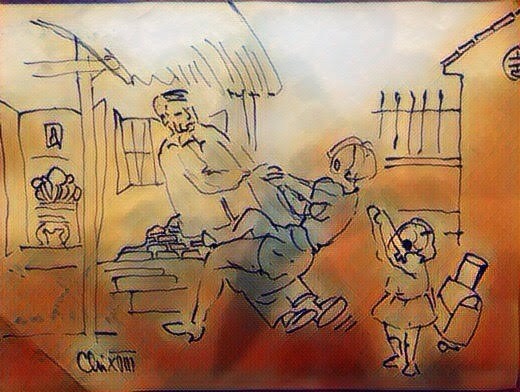 Society
Society

A few days of Tết shared for husband and wife’s family is very plausible.
 |
| Illustration by Đàm Minh Chí |
Kiều Vân
“Your husband prevented you from Tết holiday at your parents’ house, he must understand that he is breaking the law!” Nguyễn Thu Mai was surprised to hear the warning from colleagues.
After twelve years of marriage, Mai has never been able to enjoy the Tết holiday with her parents even though they live close by.
Every Tết holiday, when Mai finished work at a media office, she and two children rented a car to return to her husband’s hometown, 30km from Hà Nội, and celebrate Tết with grandparents-in-law.
According to her husband’s arrangement, he had to stay at home to worship after the New Year’s Eve, and he would return to his hometown later.
“Be home early to prepare Tết for parents-in-law, because he says this is the responsibility of a daughter-in-law, I often prepare all the food and confectionery for three days of Tết," she said.
“In the past few years, two children have come back with me, I no longer feel alone in my husband’s hometown, but I missed my parents very much.”
Her husband was the oldest child in his family so she is tasked to do everything from shopping to cleaning house for her mother-in-law for Tết holidays.
“She told me that in the past, when she got married, she had to serve her husband’s house first, before thinking about her parents,” Mai said, “I could only feel pity for myself.”
Last year, she decided to tell her husband she wanted to come back to her parents’ house during Tết. Her mother had just recovered after a severe illness and she wanted to spend the holiday with her parents.
Yet, when her husband heard it, he got angry. He thought the occasion must be in the husband’s house.
He declared that “This family has its own law that there is no Tết at the wife’s house. If it is a law, the daughter-in-law should obey.”
“Many people on a long holiday felt like, for me, it was a great inhibition,” Mai said fighting back the tears.
And Tết 2019 is coming, Mai is arranging everything to continue the status quo, “Tết in her husband’s hometown”.
Mai didn’t know that her husband was violating the law.
Under the provisions of Section 1, Chapter 3 of the Marriage and Family Law, husband and wife are equal, have equal rights and obligations in all aspects of the family, in exercising the rights and obligations of citizens.
The law clearly states husband and wife are obliged to love, be faithful, respect, care and help each other; share and implement household tasks together.
Wife and husband have rights and obligations to help each other to choose careers, study and improve professional qualifications, and participate in political, economic, cultural and social activities, according to law.
The regulations on sanctioning violations in the field of marriage and family are applied according to the Government’s Decree 167/2013 /ND-CP.
Article 52 of the decree specifies that a fine can be issued of between VNĐ100,000 ($4)-VNĐ300,000 ($12) for an act of preventing family members from meeting relatives and friends, causing constant psychological pressure for them.
If Mai’s husband prohibits or prevents her from visiting her parents, including during Tết, he will be subject to the above penalty. A lot of educated men, liked Mai’s husband, were not aware that they were violating the Marriage and Family Law.
Psychologist Nguyễn An Chất, director of An Việt Sơn Center for Psychological Counseling, said "Tết is the occasion for family members to reunite, everyone wishes to be with their close relatives. A few days of Tết shared for husband and wife’s family is very plausible".
“If there is no sympathy and sharing between the couple and from the husband’s family, this issue is likely to cause conflict.”
Husband and wife need discussions and planning in advance for Tết. The two sides should be comforted because of each other’s happiness.
“If the conditions are favourable, both can share a reasonable time to return to both husband and wife’s family houses,” he said “They can arrange this year’s Tết in the husband’s house, and the wife’s house for next year, for example.”
Mother-of-two, Trần Thu Hằng, who was working at a State enterprise in Hà Nội, took severe measure over the same issue. She had to visit her husband’s hometown in Ninh Bình Province for all holidays including Mid-Autumn festival, National Day and Tết.
In the beginning years after marriage, she tried, but later she felt too stressed and exhausted, family conflict was more and more severe. She ended up getting a divorce. — VNS




